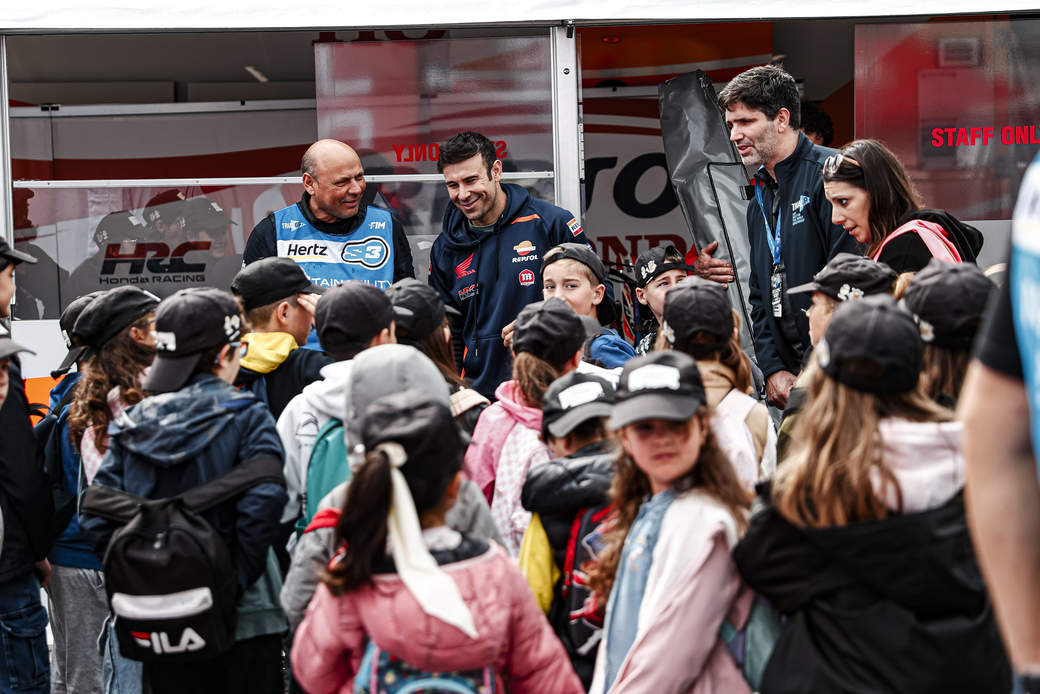The TrialGP of Portugal, round two of the 2025 Hertz FIM Trial World Championship, was staged over the weekend of 11-13 April at Viana do Castelo and has been hailed as an outstanding success in terms of sustainability with a perfect score in all key categories.
With the focus primarily on the event’s social and environmental impact, in full compliance with the FIM Environmental Code, great emphasis was placed on involving the local community and giving them the opportunity to actively participate.
With a strong policy dating back to 1992, the FIM places huge importance on sustainability and more recently implemented a renewed strategy based on the six fundamental pillars of people, sustainable events, Sustainable Development Goals (SDG), governance, awareness and climate in line with the FIM Environmental Code that promotes the protection of soil, biodiversity and water among other resources and factors.
The event was organised by the Motoclube Foz do Lima and activities emphasised respect for sporting regulations and underlined the importance of finding sustainability champions to inspire others to recognise the role of sport in facilitating sustainable development.
Actions aimed at promoting environmental awareness and the dynamic engagement of the community included an educational visit by local school students to help them gain a better understanding of sustainability in motorsport. This innovative initiative promoted environmental education in an experiential and inspiring way, directly contributing to SDG 4: Quality Education.
Other initiatives included multi-channel communication campaigns, interactive educational workshops and the distribution of reusable eco-bags to all participating riders, aligning with SDG 12: Responsible Consumption and Production.
The TrialGP of Portugal was planned with an unwavering ethical commitment to minimising the event’s ecological footprint. ...
At the TrialGP of Portugal, several measures were implemented to achieve these ambitious goals, including the strategic installation of clearly identified ‘ecological islands’ for the segregated disposal of waste such as used lubricating oils, batteries and unusable tyres.
Additionally, it strengthened the sense of community by promoting interaction between different social groups and involving local schools, scout groups and the general population in various campaigns and was respectful of the rich historical, cultural and natural heritage of Viana do Castelo, again in line with SDG 11: Sustainable Cities and Communities.
By staging the event at key locations in the city, including the historic centre and the iconic Santa Luzia, the TrialGP of Portugal helped to further strengthen the image of Viana do Castelo as a vibrant and welcoming tourist destination.
Specific and measurable environmental performance indicators (EPIs) – including the amount of waste generated and recycled, noise levels in sensitive areas and the public adhering to sustainable mobility initiatives – aided the collection of data before, during and after the event for comparative analysis and the identification of areas of success and areas that require greater attention in future editions.
The effective communication of sustainability initiatives and the results achieved is vital and throughout the event a comprehensive strategy was implemented using various channels – including the event website, social media and the local press – to inform and involve stakeholders of planned and ongoing sustainability actions, sharing practical tips for a greener event and highlighting the progress achieved.
Kattia Juárez, FIM International Sustainability Commission Director, stated: “Using the sport’s own language, the TrialGP of Portugal received ‘cleans’ in all categories. For those unfamiliar with Trial terminology, a ‘clean’ is the best performance possible and this means the event was outstanding in terms of sustainability. Through fantastic teamwork, responsible and informed working practices and, above all, a deep commitment to managing the social and environmental impact, I am confident that Trial can continue to thrive while at the same time promoting the vitally important message of sustainability.
“It is a message that grows stronger every year and events like this play a crucial role in local communities and must serve to inspire local, national and international organisers to use the sport as a catalyst for achieving the FIM’s Sustainable Development Goals.”
